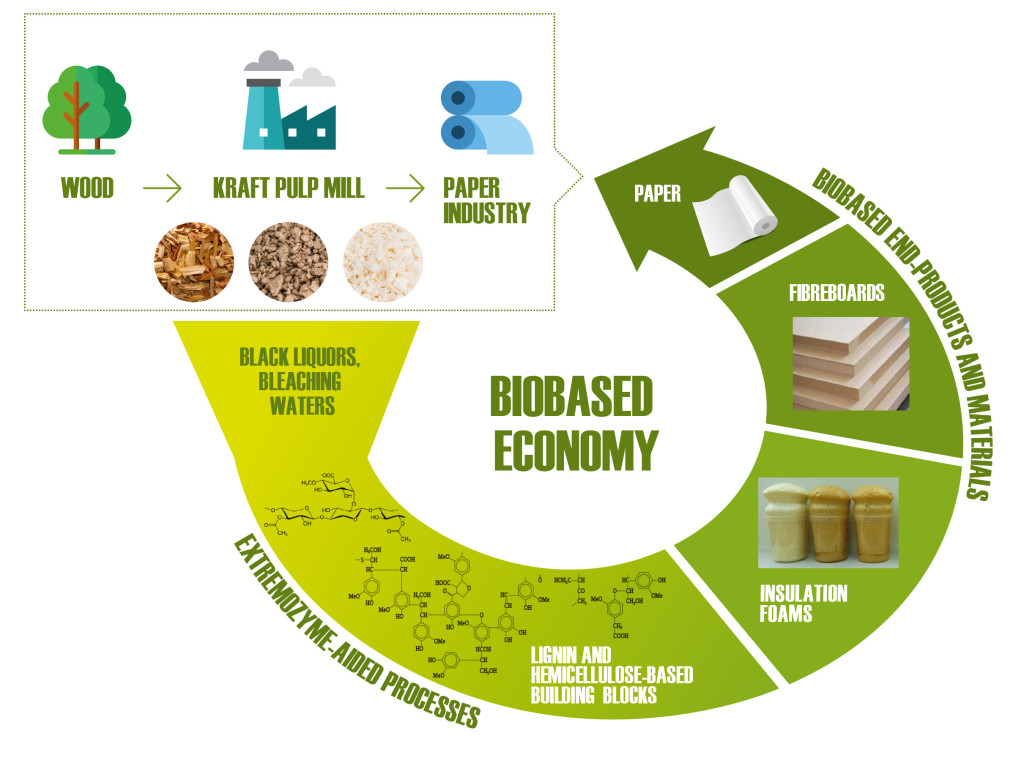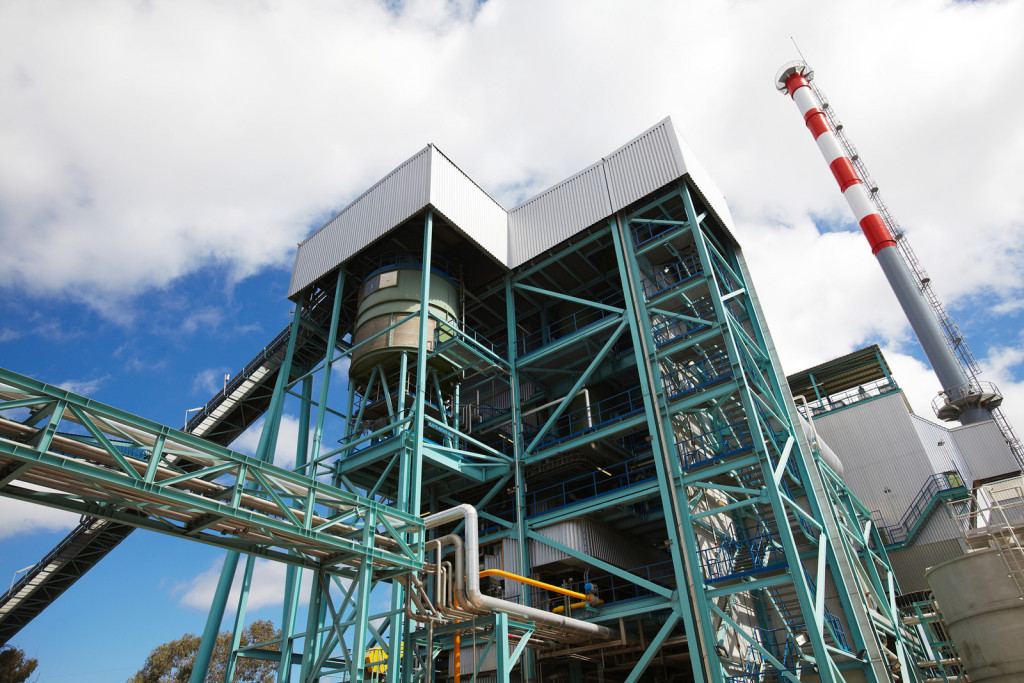WoodZymes is a H2020 project whose aim is to supply timber and paper industries with special enzymes to produce wood-based building blocks such as board and insulation bioproducts.
Current trends show that there is an increasing demand for bio-based products worldwide aiming to reduce petrochemical products and non-renewable materials used nowadays in many applications, including the building and furniture industry. The development of well-established and profitable “biorefineries” is one of the main challenges for the wood chemical industry to attain a full conversion of the plant biomass into industrial and consumer goods. Biotechnology can contribute to this aim by providing enzymatic biocatalysts to be applied in such processes to further reinforce the progressive transformation of conventional chemical industry to “green chemistry”, in which enzymes become fundamental tools.
In this context, the WoodZymes project aims to supply the timber and paper industries with “wood transforming enzymes” able to work at the extreme environment required to remove or modify hemicelluloses and recalcitrant lignin protecting cellulose in the plant cell wall. To achieve this goal we will develop tailor-made extremozymes tolerating the high pH and/or temperature conditions used in wood processing to selectively valorise underutilised lignin and hemicellulose fractions. The goal is to obtain high-value bio-equivalents of chemical building blocks currently produced from the crude oil industry, including bio-based precursors for adhesives in the manufacture of medium-density fibreboards (MDF) and as components of insulation polyurethane (PU) foams, as well as renewable papermaking additives.
Turning kraft pulp mills into biorefineries: the WoodZymes approach
 Wood typically consists of up to 50% cellulose, 25% lignin, 20% hemicelluloses and less than 5% extractable materials. However, only 2% of the lignin available from the pulp industry is commercialized nowadays, mainly from the sulfite process. During kraft (and soda) cooking, the most common (and wide-spread) technology within the pulp and paper industry, lignin is partially depolymerized and solubilised under the strong alkaline conditions used, passing to the black liquor being generally burnt to generate energy. On the other hand, the hemicelluloses and residual lignin remaining in the brown pulp after cooking are removed and released to the waste waters during the subsequent delignification and bleaching stages to obtain bleached pulp.
Wood typically consists of up to 50% cellulose, 25% lignin, 20% hemicelluloses and less than 5% extractable materials. However, only 2% of the lignin available from the pulp industry is commercialized nowadays, mainly from the sulfite process. During kraft (and soda) cooking, the most common (and wide-spread) technology within the pulp and paper industry, lignin is partially depolymerized and solubilised under the strong alkaline conditions used, passing to the black liquor being generally burnt to generate energy. On the other hand, the hemicelluloses and residual lignin remaining in the brown pulp after cooking are removed and released to the waste waters during the subsequent delignification and bleaching stages to obtain bleached pulp.
Native lignin in wood is a branched aromatic polymer that undergoes strong structural modification during alkaline cooking including the release of phenolic compounds, as well as additional condensation and oxidation reactions. Despite recent advances on catalytic processes for the valorisation of kraft lignins into aromatic chemicals, no established technology exists nowadays for its efficient depolymerization. Similarly, hemicellulose sugars are extracted from wood under harsh conditions and low yield, requiring complex and expensive purification steps for reaching high purity grades, thus limiting the development of applications.

Enzymatic depolymerization of lignin into phenolic platform chemicals is envisaged as one of the potential breakthrough applications for lignin valorisation. WoodZymes will address these challenges by developing new extremozymes able to operate under high pH values at which kraft lignin is soluble to depolymerise it, thus enabling the recovery of phenolic compounds. Moreover, extremozyme-assisted delignification and bleaching stages will allow conserving non-degraded phenols to be turned into valuable compounds and, on the other hand, recovering hemicellulose sugars currently lost in side streams or burnt, to be valorised as papermaking additives.
End-user applications
Both lignin-derived phenols and hemicellulose sugars obtained in WoodZymes will be valorised in some end-user applications selected to illustrate the potential of extremozymes in the global bio-based economy, contributing to the sustainability and competitiveness of cellulose, fibreboard and polyurethane manufacture, and establishing a direct link between pulp and wood industrial sectors.
Thus, the lignin-derived phenols resulting from the transformation of industrial lignins with tailor-made extremozymes will be evaluated as bio-equivalents of resin precursors for MDF manufacture, in substitution of fossil-based resins typically used, like phenol-formaldehyde. Moreover, enzymatic activation of lignin during MDF manufacture will be also explored. A second application includes the use of highly-reactive lignin products as replacement of fossil polyols in PU foam manufacture, to be used as insulation material. Regarding hemicellulose-based building blocks, applications include their use as additives during refining of bleached pulps and papermaking, and the synthesis of amphiphilic polymers, in combination with fatty acids, for paper coating. Finally, a techno-environmental analysis and economic impact evaluation of the newly developed materials and processes will be carried out to be compared with currently available ones.
About WoodZymes
The WoodZymes consortium covers the whole value chain from feed-stock suppliers to end-users which will ensure rapid uptake and exploitation of the project results. With this purpose it brings together one SME (MetGen, Finland) specialized in the designing, production and supply of industrial enzymes for biomass conversion, three research groups from the Spanish Research Council (CSIC) with high expertise on lignin biodegradation and oxidoreductases (CIB, Project Coordinator), extremophilic hydrolases (IATA) and chemical analysis of lignin and lignocellulosic materials (IRNAS); three technological centres dedicated to developing more sustainable and cleaner processes for the pulp and paper industry (CTP, France & RAIZ, Portugal) or the forest(wood)-based sector (FCBA, France); as well as four world-leading companies in the sectors of bleached eucalypt kraft pulp and printing paper (The Navigator Company, Portugal), softwood kraft pulp (Fibre Excellence, France), fibreboards (FINSA, France) and insulation materials (Soprema, France).
WoodZymes is a Research & Innovation Action funded with 3.25 M€ by the Bio-based Industries Joint Undertaking. The project was launched in June 2018 and will run for 3 years.
Further information on www.woodzymes.eu and @WoodZymes
 This project has received funding from the Bio Based Industries Joint Undertaking (JU) under grant agreement No 792070. The JU receives support from the EU’s Horizon 2020 research and innovation programme and the Bio Based Industries Consortium.
This project has received funding from the Bio Based Industries Joint Undertaking (JU) under grant agreement No 792070. The JU receives support from the EU’s Horizon 2020 research and innovation programme and the Bio Based Industries Consortium.
Text provided by Susana Camarero (CIB, CSIC) and Marta Pérez-Boada (CIB, CSIC).


